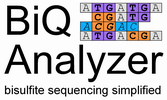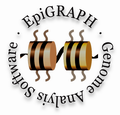
max planck institut
informatik
informatik



At the Max Planck Institute for Informatics, we develop bioinformatic methods and software that address the needs of wet-lab researchers working on epigenetics / epigenomics (see http://www.computational-epigenetics.de for details). Your feedback on the existing tools (see below) as well as requests for novel methods and tools are highly appreciated (please contact Christoph Bock for further discussion).
 |
BiQ Analyzer (http://biq-analyzer.bioinf.mpi-inf.mpg.de/) is a software tool for easy visualization and quality control of DNA methylation data. With more than a thousand downloads so far, BiQ Analyzer has become a standard tool for processing DNA methylation data from bisulfite sequencing. BiQ Analyzer has been selected by ABI to be part of the Applied Biosystems Software Community Program. |
 |
MethMarker (http://methmarker.mpi-inf.mpg.de/) facilitates the design of DNA methylation assays for COBRA, bisulfite SNuPE, bisulfite pyrosequencing, MethyLight and MSP. It also implements a systematic workflow for design, optimization and (computational) validation of DNA methylation biomarkers. This workflow starts from a preselected differentially methylated region (DMR) and results in an optimized DNA methylation assay that is ready to be tested in a large-scale clinical trial. |
 |
EpiGRAPH (http://epigraph.mpi-inf.mpg.de/) enables biologists to analyze genome and epigenome datasets with powerful statistical and machine learning methods. In a typical workflow, the user uploads a set of genomic regions of interest (e.g. experimentally mapped enhancers, hotspots of epigenetic regulation or sites exhibiting disease-specific alterations), and EpiGRAPH searches a large database of (epi-) genomic attributes for significant overlap and correlation with the regions in the input dataset. Furthermore, EpiGRAPH can predict the status of genomic regions that were not included in the input dataset. |
A broad overview of bioinformatic tools that are useful for epigenetic research is provided in our recent review on computational epigenetics: http://bioinformatics.oxfordjournals.org/cgi/content/full/24/1/1.
Please see References on how to cite BiQ Analyzer